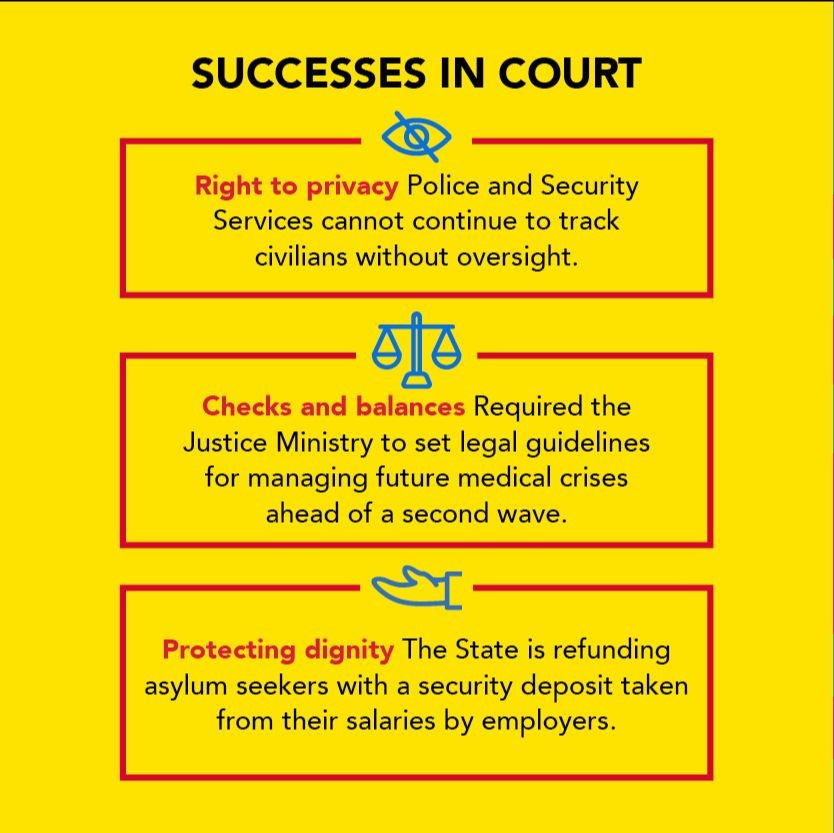
After over a year without a functioning Knesset, ACRI is pleased to bring back the "Knesset Roundup," highlighting legislation and its implications for human rights. To sign up for our newsletter click here.
Security Service Tracking Civilians in Fight Against COVID-19
Proposed bill authorizing the Israeli General Security Services (Shin Bet) to Assist in the National Effort to Reduce the Spread of the New Corona Virus (Temporary Order)
Foreign Affairs and Defense Committee | Wednesday, July 15, 2020, 9:00 AM
ACRI’s Position: ACRI is against the bill and submitted a petition against the temporary law currently allowing for the Shin Bet Tracking to continue. The High Court of Justice will hear the petition Sunday, July 19, 2020.
The Shin Bet national secret security organization had legal jurisdiction to invade privacy and gather information for national security issues only. Using these powers to monitor civilians in a domestic matter is fundamentally unacceptable in a democratic state. Shin Bet capabilities do not present a complete and infallible response to the epidemic, and may also lead to a false sense of security and impair public confidence. Even if these measures were proportionately effective, there are alternative measures that do not violate privacy of civilians, such as the epidemiological investigations being done in other democratic countries and voluntarily-downloaded apps that do not relay meta-data. Read further about our previous petitions on the subject here.
Restricting Court Activity in Emergency State
Urgent discussion: “Supervision of the Constitution Committee on the Regulations During a State of Emergency Regarding Civil Court in the Legal System”
Constitution, Law and Justice Committee | Monday, July 13, 2020, 9:30 AM
At the beginning of the COVID-19 crisis, the Minister of Justice declared a state of emergency in the courts, and enacted regulations that served the court’s activity. The emergency regulations enacted pertaining to hearings during civil emergencies do not require the approval of the Constitutional Committee, and were passed by the Minister of Justice without the Knesset’s supervision or commentary.
ACRI’s position: Precisely during an emergency, when regulations are frequently amended and the chances of infringing on civil rights is heightened, close parliamentary supervision is paramount. ACRI filed a petition regarding the authority of the government to set limits on the activities of the courts during a state of emergency, in which we sought to ensure the separation between government authorities and the independence of the judicial system.
The "Corona Law"
Proposed Law: Special powers for Confronting the New Coronavirus (Temporary Provision), – Preparation for Second and Third Reading
Constitution, Law, and Justice Committee | Sunday, 12 July 2020 9:30 AM; Tuesday, 14 July, 2020, 2:00 PM
The proposed law seeks to establish an arrangement enforcing quarantine and social distancing when a health emergency is declared due to COVID-19 in permanent legislation (as distinct from emergency regulations). The proposal established a mechanism for declaring a state of emergency; permits the enactment of regulations concerning quarantine and social distancing; and establishes powers for the enforcement thereof.
ACRI’s position holds that one of the key difficulties in the proposed law is that the authority to declare a state of emergency and to enact regulations being transferred to the government, rather than being held by the legislature in order to ensure checks and balances, transparency, and public participation in the legislative process.
The ripples of COVID-19 will stick with us for the foreseeable future - below are just some of the actions we have taken, and continue to defend, during this life-changing pandemic.


Congestion in Prisons
Preparations by the Israel Prison Service for the implementation of the High Court of Justice ruling concerning congestion in prisons – implementation of the Dorner Report – alternatives to detention; attended by Justice (Ret.) Ms. Dalia Dorner.
Internal Affairs and Environment Committee | Tuesday, July 14, 2020, 9:30 AM
ACRI’s position: Two months have passed since the deadline set by the High Court of Justice for the implementation of its ruling concerning the minimum area for a prisoner (4.5 sq.m.), following ACRI's successful petition. Although the date for implementation was already delayed once after the government failed to meet the deadline set in the original ruling, the officials have now informed the High Court that only 40% of all imprisonment places meet the required standard. ACRI believes that this constitutes grave disregard for the basic right of prisoners to a dignified existence, and that the government should have acted more effectively in order to reduce the number of incarcerated persons. The current emphasis on solutions based on long-term construction plans is unreasonable. The State should present a short-term plan for the implementation of the ruling.
Detentions in Israel
Criminal Detentions in Israel – State Comptroller’s Report 70B
State Control Committee, Wednesday 8 July 2020, 9:00 AM
The State Comptroller’s report paints a depressing picture concerning criminal detentions in Israel: unnecessary detentions; the “disappearance” of data relating to over 100,000 detention reports issued in the period 2016-2018 from the Police detention statistics; failure to implement properly the right to consultation with an attorney; and failure by police officers to state the cause of arrest in the detention reports they complete.
ACRI’s position: ACRI emphasizes the need to conduct systematic data collection and analysis in order to advance policy reform. For example, in addressing the phenomena of over-policing and racial profiling, reliable data on those detained is needed, disaggregated for ethnicity and nationality. ACRI's experience shows that the Police tend to regard detention as a routine tool rather than a last resort. In many instances detention is used to "teach a lesson," as a deterrence, or simply to make conditions for investigation more favorable. All these motives are completely incompatible with the purpose of the Detentions Law.
